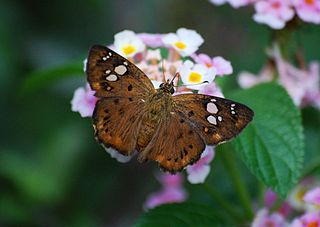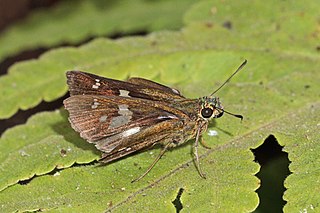
Burara jaina, the orange awlet, is a species of hesperid butterfly found in Asia. The butterfly was reassigned to the genus Burara by Vane-Wright and de Jong (2003), and is considered Burara jaina by them.

Cupitha is a genus of butterflies in the family Hesperiidae. It is monotypic, being represented by the single species Cupitha purreea, commonly known as the wax dart.

Gangara thyrsis, commonly known as the giant redeye, is a species of butterfly belonging to the family Hesperiidae. It breeds on a number of palm species.

Halpe homolea, the Indian ace or Ceylon ace, is a butterfly belonging to the family Hesperiidae.

Iambrix salsala, the chestnut bob, is a butterfly belonging to the family Hesperiidae, that is found in parts of South Asia and Southeast Asia.

Salanoemia sala, the maculate lancer, is a butterfly belonging to the family Hesperiidae found in India, Thailand, Laos and Vietnam.

Taractrocera ceramas, commonly known as the Tamil grass dart, is a species of butterfly belonging to the family Hesperiidae. It is found from the Western Ghats to Mumbai, in the hills of southern India, in northeast India to northern Burma and in south-eastern China.

Coladenia indrani, the tricolour pied flat, is a butterfly belonging to the family Hesperiidae found in Sri Lanka, India to Myanmar. The species was first described by Frederic Moore in 1865.

Pseudocoladenia dan, commonly known as the fulvous pied flat, is an Indomalayan species of butterfly in the family Hesperiidae. It is found from India to southeast Asia.

Gerosis bhagava, also known as the common yellow-breast flat, is a species of butterfly in the family Hesperiidae.

Hyarotis microstictum, the brush flitter, is a butterfly belonging to the family Hesperiidae. It is found in the Indomalayan realm and in South India. H. m. coorga Evans, 1949 is the subspecies found in South India. H. m. microstictum is the subspecies found in the Indomalayan realm.

Celaenorrhinus is a genus of skipper butterflies which are commonly termed sprites. An alternate name is flats, for their habit of holding their wings flat when resting, but this is also used for related genera. They are the type genus of tribe Celaenorrhinini.

Prosotas noreia, the white-tipped lineblue, is a species of lycaenid butterfly found in South Asia and Java.

Gangara lebadea, commonly known as the banded redeye, is a species of hesperid butterfly found in Southeast Asia.

Caleta decidia, the angled Pierrot, is a species of blue butterfly found in south Asia and southeast Asia.

Polytremis eltola, the yellow spot swift, is a species of skipper butterfly found in the Indomalayan realm.

Pseudohaetera hypaesia, the hypaesia satyr, is a butterfly species from the subfamily Satyrinae in the family Nymphalidae.

Zographetus ogygia, the purple spotted flitter, is a butterfly belonging to the family Hesperiidae.

Aeromachus stigmata, the veined scrub hopper, is a skipper, a type of butterfly in the family Hesperiidae. The species was first described by Frederic Moore in 1878.


















